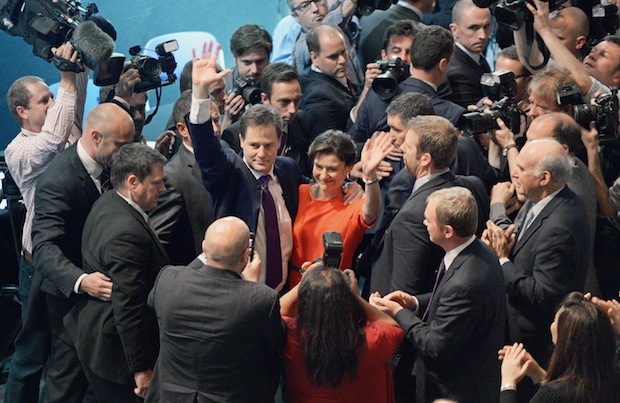Why did Nick Clegg choose to give ‘his most personal speech so far’ at this year’s autumn conference? Ed Miliband, after all, has been giving these speeches for three years now, each apparently more personal than the last. And Clegg doesn’t really have any more compelling a story than anyone else in Westminster: like Miliband, his parents have a fascinating story to tell, but his own upbringing has been pretty standard for a politician.
But this conference was the first opportunity Clegg has really had to market himself because for a few years his reputation was so toxic in the country, and the decision he had taken to go into coalition such an emotional shock for his party that it was best to stick to the issues, not the man.
But this year the Lib Dem leader has firmly made his mark on the party. As James blogged earlier, the Liberal Democrats are Clegg’s party now. The votes that he won this week weren’t just convenient in terms of governing with a mandate from activists, they were also a stamp of Nick Clegg’s authority. They showed that he could ask his party to step up to the mark with the confidence that it would, rather than the risk of a bloody nose and a retreat.
The increased authority also meant Clegg could explain why he is a Liberal Democrat. He told the conference hall this afternoon that people ‘need to know who we are. Who I am. Why I’m a Liberal Democrat and why I’m standing here today’. He could have been talking about his party specifically: there have been low points when some of the left-wing members have asked why or indeed whether Clegg is a Lib Dem. Today, with a spring in his step, he took the opportunity to do that.
This focus on identity is part of another important shift in our politics as a whole. The Tories know they need to market David Cameron as an asset in the 2015 election, which is why they have hired Jim Messina to work for them. His job is to get Cameron elected, not change Tory beliefs particularly. The 2015 campaign will be a presidential one, and given Cameron’s popularity relative to his party, that makes sense for the Conservatives. But Clegg clearly wants a piece of this presidential action too. His team now sees more than ever that Ed Miliband does not possess the gravitas of either Cameron or Clegg: those who worked with the Labour leader on Syria and Leveson were unimpressed by his inability to be decisive. The Coalition leaders can drive that point home by making their own campaigns as much about their leadership abilities as they are about their parties. And that raises the stakes even higher for Miliband when he speaks at his own conference next week.







Comments